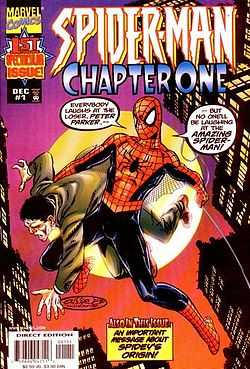Spider-Man: Chapter One
| Spider-Man: Chapter One | |
|---|---|
 Cover to Spider-Man: Chapter One #1. Art by John Byrne. This image is a homage to Stan Lee and Steve Ditko's August 1962 cover for Amazing Fantasy #15, which was the first appearance of Spider-Man. | |
| Publication information | |
| Publisher | Marvel Comics |
| Schedule | Monthly |
| Format | Limited series |
| Genre | |
| Publication date | December 1998 – October 1999 |
| Number of issues | 13 (#0-12) |
| Main character(s) | Spider-Man |
| Creative team | |
| Writer(s) | John Byrne |
| Artist(s) |
John Byrne Al Milgrom (#10, 12) |
| Letterer(s) | John Byrne |
| Colorist(s) |
John Kalisz (#1-2) Joe Andreani (#3) Steve Buccellato (#4-5) Christie Scheele (#6-7) Mark McNabb (#8-10) Mark Bernardo (#9-10) Joe Rosas (#11-12) |
| Editor(s) | Ralph Macchio |
Spider-Man: Chapter One is a comic book limited series starring Spider-Man published by Marvel Comics for 13 issues (#1-12, with a #0 added between #6 and #7) from December 1998 to October 1999. The entire series was written and drawn by John Byrne.
Reception
The comic was a modest success. Some comics fans objected to Byrne's perceived tampering with the classic Spider-Man stories produced by his creators Stan Lee and Steve Ditko and complained that the original 1960s stories did not require any updating at all. The editorial intention of the series, however, was to be a retelling of the character's early stories designed to draw in new readers. Byrne was soon to be drawing the relaunch of the Amazing Spider-Man comics title with writer Howard Mackie.
Chapter One, though not a sales record-breaker (possibly because it was sold only through the direct market, which limited its exposure to potential new readers), finished out its run as planned, even adding a #0 in April 1999 between #6 and 7. Byrne was asked to, but declined the offer to do a "Chapter Two" follow-up mini.
Since Byrne left the Spider-Man titles, his successors have shied away from making any references to the series, and according to the Official Index to the Marvel Universe it is now Marvel's stance that the original stories have regained their canonical status. Chapter One also brought controversy over the former ongoing series Untold Tales of Spider-Man (1995-1997), where the stories presented were brand new stories set in Spider-Man's early super-hero career, set in-between the original stories by Stan Lee and Steve Ditko. Chapter One ignores the continuity of Untold Tales of Spider-Man.
Spider-Man's early adventures would be retold again in Ultimate Spider-Man, a series Marvel launched in 2000. This series sidestepped the canon/non-canon continuity question by setting its stories in an entirely new universe.
Yet another retelling of early Spider-Man stories came in 2004 with the launch of Marvel Age Spider-Man (later retitled Marvel Adventures Spider-Man). This title, which is aimed at younger readers, also retells many of Lee and Ditko's stories (as Chapter One did), though the series is clearly meant to be set outside mainstream Marvel continuity.
Collected editions
A trade paperback collecting the entire series was published in January 2012 (ISBN 0-7851-5848-0).
Legacy
The villains' costumes were later used for their mainstream counterparts in Amazing Spider-Man Vol. 2 and Peter Parker: Spider-Man Vol. 2.[citation needed]
External links
- Spider-Man: Chapter One at the Grand Comics Database
- Spider-Man: Chapter One at the Comic Book DB